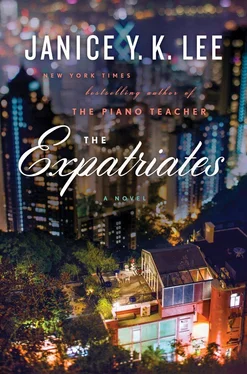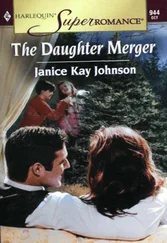When Julian came into their lives, the few people they told assumed they were going to adopt him. And she thought so too. Once she and David took him out for dim sum on the weekend, an awkward outing, both parties not knowing how to move it forward, how to take the next step, paralyzed by the notion that it might be a mistake from which they would never recover. She cannot understand all the other families around her, the ones who add to their families with such single-minded, deliberate simplicity and assurance.
“I just knew,” they say. “As soon as I walked into the orphanage and saw Mei, as soon as I did, I knew that she was mine. She looked at me and I looked at her and we both knew.”
“How?” she wants to ask them. “How did you know?”
But, of course, no one ever asks that. They tell their stories all in the same way: how they filled out their applications and waited and waited, the sudden call, the hastily booked flight, the anonymous hotel room they bring their new child to, the formula bought on the fly. The children never cry, because it never did them any good in the orphanage. Then they have tantrums. These adoptive parents have a network, and they help one another. They know their children when they see them.
They seem wholeheartedly good in a way that she cannot understand, because she is in some way bad, or selfish, or ignorant, or unwilling to believe, because she cannot recognize her child when she sees him. They believe her to be one of them, but she is not.
“You’ll know,” they say.
So she looks at Julian and tries to know. But all she can see is the questions. What if he hates her? What if he tries to run away? What if he has some genetic disease that will waste him away before he turns thirteen? What if — and this is the big one — what if she can’t love him? She knows these are selfish questions, not the kind she is supposed to be asking. She is supposed to care about his well-being, about how his life will be, but she cannot shake off her commitment to herself. Sometimes she thinks that is what the nine months are for, so that women can get to know the person inside them, that it is a mingling at first of self and child, and then after the baby is born, that is when you can become the selfless, generous mother you are supposed to be. She doesn’t have that yet, she thinks. Maybe nine months of getting to know him is what she needs.
And then, just when she and David seemed to be moving to some sort of decision, there was a spate of articles in the paper about a family who was essentially giving up their adopted child. Facts were murky and hard to come by, but the family was Dutch, and the child, Chinese. They had adopted him about three years ago, and they wanted to give him back. There were outraged letters to the editor, saying that adopting a child was not like buying a pair of pants — you couldn’t return him when he didn’t fit. There were racial overtones, of course, the privileged white minority and the beleaguered local community.
She read each day’s developments with a heightening sense of dread. She was implicated in this, she knew it. There was some lesson being taught, but she didn’t know what it was. Was what they were doing worse than this family? They were essentially trying out Julian, without adopting him, bringing him home, interacting with him, seeing if this could work. At brunch at the American Club, a woman brought it up, quite aggressively, and so now she doesn’t mention it anymore. Another thing to be ashamed about.
David lets her drive the process. He is supportive enough, but she knows he thinks she is being crazy about the whole thing, that it will just happen if they relax. Or that they can adopt. He is noncommittal about either situation, which seems to her a strange reaction to something so momentous, but she doesn’t push him on it. He seems to dissolve into the workday and come back spent. Whether they’re driving to a restaurant or taking turns in the shower in the morning, the complaints and discontents of their marriage have reached a granular level that surprises her with its mundane primacy: He never recaps the toothpaste; he never lets her know his schedule, then acts surprised when she is not available or is miffed when there’s nothing for him to eat. They bother her in a deep, distant way, as if they are coming from far, far away. Marriages are mysteries to everyone, she supposes, most of all to the people in them, if they are not paying attention.
Hilary sits and waits for her friend — her chronically late friend, who has told her she needs to see her — so that they can have lunch. She sits and waits at the table, seeing the white surface of it made gold by the light, with the sounds of shouting children and bursts of laughter and women’s chatter surrounding her, and wonders how she can feel so closed off from it all, how she feels as if she’s in an echo chamber, apart from everyone else, excised from the collective experience of a cool winter afternoon.
But she remembers. She remembers having moments when she felt lifted with gratitude. It was dizzyingly gratifying to feel that you wanted nothing more than what you had at that moment: a hot latte with a full head of foam, and a newspaper filled with facts you were about to learn, a man sitting next to you who wanted to be there. Those moments are there in her past, glimmering like small flames in the far, far dark of her memories. Maybe she has to go back to go forward to get there again. Maybe that’s what she needs to do.

Olivia arrives, finally. Forty minutes late.
She is Chinese, striking.
“Hello, darling,” she says. Never an apology for being late. People wait for Olivia. She takes off her sunglasses and waves them around. “Nice day for December, isn’t it? I love that you can sit outside in Hong Kong year-round. Nowhere like it.” The sky is crisp and blue, the blue-green sea meeting it in a flat line. She is wearing tan wool trousers and a brown chunky-knit sweater.
“It’s wonderful today.”
“Let’s get some drinks.” She waves her hand to the waiter. “Hello, Kevin,” she says. “Chrysanthemum tea.”
Hilary asked Olivia once why she didn’t speak Cantonese to the staff. Her English is perfect but stiff, as if she is elocuting, not talking.
“I do when I’m with family and other Chinese,” Olivia had said, surprised. “I’m with you, and I think it would be impolite.”
“Like you were talking about me to them or something?”
“I suppose,” she said. “I haven’t really thought about why, just do it naturally. Sometimes I don’t even know what I’m speaking unless someone comments on it.”
The tea comes, and Olivia pours Hilary her cup first. This is something Hilary loves, how everyone is so polite here at the table. They serve others the choice bits first, would never dream of eating before a guest, never drink the last of the wine, fight to pay the bill. An admirable trait of Asian culture, but then you are horrified when you go back to the United States and it’s a free-for-all and every man for himself.
“My mother would faint, us sitting outside,” Olivia says. “She always says that you should retain warmth. After I had Dorothy, she didn’t let me go outside for a month, literally. You know, the confinement period, when they make you eat foul broths and teas and you can’t wash your hair.”
“This is for you,” Hilary says, and gives her a shopping bag tied with red ribbon. “Belated birthday. Open it later, though. I hate it when people open presents in front of me.”
Olivia is a citizen of the world, one of those effortlessly cosmopolitan people. She has lived in London, New York, Paris, but prefers Hong Kong to all else. She has been to every restaurant, every spa, every good hotel. She can hold forth on where to get the best massage in Morocco, a good driver in Italy, a yoga teacher in Bali.
Читать дальше













